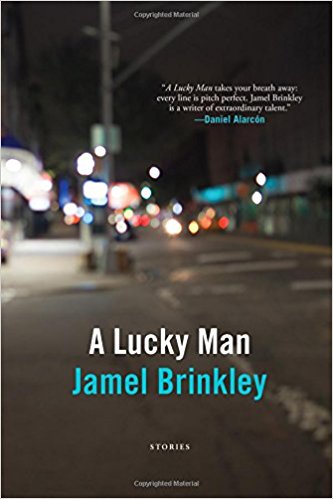GRAYWOLF PRESS, 2018. 264 Pages. ISBN: 978-1555978051
By Robert Hunsberger
Told in nine vivid short stories, Jamel Brinkley’s debut collection, A Lucky Man, tugs sharply at the tender threads of intimacy, race, and masculinity. Brinkley’s prose, as fierce in its vigilance as it is in its empathy, casts new light on the delicate and heartbreaking truisms of American manhood. The black men and boys that populate Brinkley’s stories find themselves struggling to reconcile their hopes and expectations with the indistinct gloom of their realities.
In the first story of the collection, “No More than A Bubble,” two college-age friends, Ben and Claudius, tramp through a party in search of girls. The narrator, Ben, is eager to make use of the condom his father gave him to spend specifically on a wild woman. His father told him to:
“Use this with the most delicious woman you can find, una pazza. Let her screw your brains out, once and never again. Then marry a nice, boring, fat girl with hands and thighs like old milk.”
When the opportunity presents for Claudius and Ben to walk two women back to their Brooklyn apartment, they seize their moment. Before allowing the two men to join them, the women have Claudius and Ben undress and stare at each other, demanding they be “fully present.” Ben writes, “I did, however, get to use my father’s condom. I’d intended to use it, had become fanatical about doing so, and finally did, just as Claudius—perhaps another true son of another confused father—got to use the use the condom he carried around in his pocket.” The two men played their roles in the masculine production of sexual conquest, but still there was a disconnect between their expectation of the moment and the reality they were faced with. Their idea of intimacy and sex had proved itself inadequate, and the young men were ill-equipped to cope with the experience. Brinkley offers an achingly somber insight into their shame and disillusionment as Ben and Claudius wake the following morning:
“All at once an acute ugliness shuddered into being, a face revealed within his face, and he must have seen it within mine too. It has been that way with people in my life, with people I have loved: a fine dispersal, a rupture as quiet as two lips parting, a change so sudden one morning, so slight, you wonder if they had ever been beautiful at all.”
In “I Happy Am,” a young boy named Freddy who imagines himself as a robot or an angel or a wizard, takes his first trip to the suburbs with his friends at St. Rita’s Day Camp. Freddy pictures the suburban house in his mind, large and well-appointed with a pool, a garden, and an angelic white woman named Mrs. Johnson. He is disappointed to arrive at an unremarkable house owned by a black woman. It reminds him of his usual life and surroundings. He remarks that "Nothing's what it's supposed to be like." The story becomes an especially poignant glimpse into the burgeoning mind of a young boy as he wrestles with his first feelings of disillusionment, his first, bitter brush with privilege, and his first taste of hopelessness. The woman who owns the home, middle-aged and lonely, asks Freddy to touch her pregnant belly for good luck.
“Need a lot of luck in this terrible world.”
Lincoln Murray, the protagonist of the collection’s title story, struggles to cope with resentment stemming from his wife leaving him. On the subway, he takes a photo of an unsuspecting woman. He describes her face as, “Something like a scowl, the expression seemed different on women of a certain beauty, like they had never had to justify their use of it—they just assumed they had the right.” There is an unsettling aspect to this description, an underlying anger. Lincoln is both enamored with and threatened by beauty. The subway woman reminds Lincoln of his wife, who doesn’t show the same signs of aging that he does. Lincoln admires his wife’s beauty, “Yet he also felt the urge to press the sharps of his teeth against her face, to bite down and place the first deep crack in it.” Brinkley carefully uses Lincoln to highlight the emotional shortcomings of a culture obsessed with superficiality. These shortcomings isolate Lincoln from his loved ones, and the world at large. Brinkley writes, “maybe, slumped in his chair at the desk, unable to muster the little strength it took to hold in his belly, it was his luck that he was alone with.”
Each of Brinkley’s true-to-life stories offers the reader marvelous depth and insight into the complex emotional landscapes of America’s wayward sons. His characters boil beneath the surface, desperate for a surer emotional foothold, struggling to communicate and reconcile their vulnerabilities with their worlds, and forced to settle for the life that luck has handed them.

